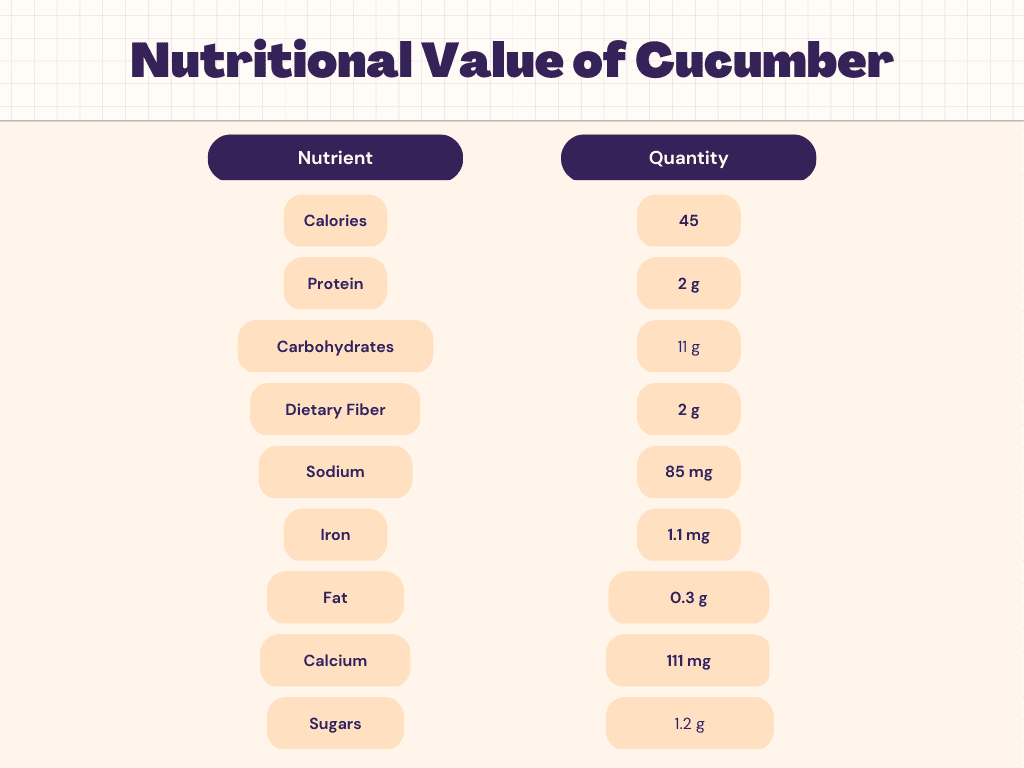Cucumbers are a popular vegetable that is known for their refreshing taste and crunchy texture. While they are often used as a low-calorie addition to salads and sandwiches, cucumbers can also be a healthy and nutritious snack on their own. In addition to being low in calories and high in water content, cucumbers are a good source of several important nutrients, including vitamin K, vitamin C, and potassium. In this article, we will explore the nutritional profile of cucumbers, including their calorie, protein, and carbohydrate content, to help you better understand the health benefits of this versatile vegetable.
Nutritional Value Of Cucumber
Nutritional Facts of Cucumber
Carbs In Cucumber
Cucumbers are a low-carb vegetable that is a great addition to any healthy diet. One medium-sized cucumber with the skin on contains around 11 grams of carbohydrates, of which 2 grams is fiber. This means that cucumbers are a good source of dietary fiber, which can help promote feelings of fullness, support digestive health, and regulate blood sugar levels. Cucumbers are also a good source of vitamins and minerals, including vitamin C, vitamin K, and potassium. With their low-calorie content and high nutrient density, cucumbers can be a great option for those looking to maintain a healthy weight and improve overall health.
Protein In Cucumber
Cucumbers are not a significant source of protein. One medium-sized cucumber with the skin on contains around 2 grams of protein, which is a relatively small amount compared to other protein-rich foods. However, it is important to note that cucumbers are still a nutritious vegetable that can contribute to a balanced and healthy diet. While protein is essential for building and repairing body tissues, cucumbers are a good source of other important nutrients, such as vitamin C, vitamin K, and potassium. Additionally, cucumbers are low in calories and high in water content, which can make them a refreshing and hydrating snack option.
Health Benefits Of Cucumber
Cucumbers are a nutrient-dense vegetable that can offer a range of health benefits, including for individuals with certain health conditions. Here are some potential benefits of cucumbers for PCOS, diabetes, thyroid health, and weight loss:
- PCOS: Polycystic Ovary Syndrome (PCOS) is a hormonal disorder that can cause irregular periods, fertility issues, and other symptoms. Cucumbers are low in calories, high in fiber and rich in antioxidants, which can help improve insulin resistance and reduce inflammation, both of which are associated with PCOS. Check our PCOS Plans here.
- Diabetes: Cucumbers are a low-carbohydrate vegetable that can be a good option for individuals with diabetes. The fiber in cucumbers can help slow the absorption of sugar into the bloodstream, which can help regulate blood sugar levels. Cucumbers also contain polyphenols, which have been shown to have potential blood sugar-lowering effects. Check our Diabetes Plans here.
- Thyroid health: Cucumbers are a good source of vitamins and minerals, including vitamin K, which is important for healthy thyroid function. Additionally, the high water content in cucumbers can help support hydration, which is important for maintaining a healthy metabolism. Check our Thyroid Plans here.
- Weight loss: Cucumbers are low in calories, high in fiber, and high in water content, which can make them a filling and hydrating snack option. Eating cucumbers can help support feelings of fullness, which can make it easier to control calorie intake and promote weight loss. Check our Weight Loss Plans here.
It’s important to note that while cucumbers can offer potential health benefits, they should not be considered a substitute for medical treatment or dietary advice from a healthcare professional.
Vitamins & Minerals in Cucumber
Cucumbers are a good source of vitamins and minerals that are essential for overall health. Here are some of the vitamins and minerals found in cucumbers:
- Vitamin C: Cucumbers contain vitamin C, which is an antioxidant that helps protect cells from damage, supports immune function, and promotes healthy skin.
- Vitamin K: Cucumbers are a good source of vitamin K, which is important for healthy blood clotting and bone health.
- Potassium: Cucumbers are a good source of potassium, which is important for regulating blood pressure, supporting heart health, and maintaining healthy muscle and nerve function.
- Magnesium: Cucumbers contain magnesium, which is important for supporting healthy bone and muscle function, regulating blood sugar levels, and maintaining healthy nerve function.
- Manganese: Cucumbers are a good source of manganese, which is important for supporting healthy bone development, wound healing, and metabolism.
- Folate: Cucumbers contain folate, which is important for healthy cell growth and development, and is especially important for pregnant women to support fetal development.
- Other nutrients: Cucumbers also contain small amounts of other nutrients, such as vitamin B6, calcium, iron, and zinc.
Overall, cucumbers are a nutrient-dense vegetable that can be a healthy addition to a balanced diet.
The Bottom Line
Cucumbers are a low-calorie, nutrient-dense vegetable that can offer a range of health benefits. They are a good source of vitamins and minerals, including vitamin C, vitamin K, potassium, magnesium, manganese, and folate, and contain small amounts of other nutrients. Cucumbers can potentially be beneficial for individuals with conditions such as PCOS, diabetes, and thyroid disorders, and can also be helpful for weight loss. While cucumbers can offer health benefits, they should not be considered a substitute for medical treatment or dietary advice from a healthcare professional.
Faqs
How many cucumbers can I eat in a day?
The amount of cucumber a person can eat in a day depends on various factors such as individual nutritional needs, health conditions, and dietary preferences. Generally, cucumbers are low-calorie vegetables that can be consumed in moderate amounts as part of a healthy and balanced diet.
The recommended daily intake of fruits and vegetables varies depending on age, gender, and level of physical activity. However, a good rule of thumb is to aim for at least 5 servings (or 2.5 cups) of fruits and vegetables per day. Cucumbers can be a great addition to this goal and can be eaten raw as a snack or salad, or used in a variety of recipes such as smoothies or cucumber-infused water.
It’s important to note that while cucumbers are generally safe to eat, some people may be allergic to them. Additionally, individuals with certain health conditions may need to limit their intake of cucumbers or other fruits and vegetables, as recommended by their healthcare provider. If you have any concerns about how many cucumbers to eat, it’s best to speak with a healthcare professional or a registered dietitian for personalized advice.
Should I eat Cucumber before or after exercise?
Eating cucumber before or after exercise can depend on personal preference, dietary needs, and exercise goals.
Before exercise: Eating a snack that contains carbohydrates and some protein before exercise can help provide energy and prevent low blood sugar levels during the workout. Cucumbers are a low-carbohydrate food and do not provide a significant amount of protein, so they may not be the best pre-workout snack on their own. However, you can pair them with other foods that contain carbohydrates and protein, such as hummus or Greek yogurt, for a more balanced snack.
After exercise: After exercise, it’s important to consume protein to help repair and rebuild muscle tissue. While cucumbers do not provide a significant amount of protein, they can be combined with other protein sources, such as a hard-boiled egg or chicken breast, to create a balanced post-workout snack or meal. Additionally, cucumbers can help rehydrate the body after exercise due to their high water content.
Overall, while cucumbers can be a healthy addition to a balanced diet, they may not be the most effective snack to consume before or after exercise on their own. It’s best to pair them with other foods that provide carbohydrates and protein to support energy levels and muscle recovery.
What are the benefits of Cucumber?
Cucumbers are a low-calorie, nutrient-dense vegetable that offers a range of potential health benefits, including:
- Hydration: Cucumbers are 95% water, making them a great way to stay hydrated.
- Nutrient-dense: Cucumbers are a good source of vitamins and minerals, including vitamin C, vitamin K, potassium, magnesium, manganese, and folate.
- Weight loss: Cucumbers are low in calories and high in fiber, which can help promote feelings of fullness and support weight loss.
- Skin health: Cucumbers contain antioxidants and vitamin C, which can help promote healthy skin and prevent signs of aging.
- Digestive health: Cucumbers are high in water and fiber, which can help support regular bowel movements and promote digestive health.
- Heart health: Cucumbers are a good source of potassium, which can help regulate blood pressure and support heart health.
- Potential anti-inflammatory effects: Cucumbers contain flavonoids and other compounds that may have anti-inflammatory effects and help reduce the risk of chronic diseases.
- May help manage diabetes: Cucumbers are low in carbohydrates and have a low glycemic index, which may help regulate blood sugar levels.
- May support thyroid health: Cucumbers contain trace amounts of iodine, which is important for thyroid function.
What is the best time to eat Cucumber?
There is no specific “best” time to eat cucumbers, as it ultimately depends on individual preferences and dietary needs. Cucumbers can be enjoyed as a healthy snack, incorporated into salads, or used in a variety of recipes, so they can be consumed at any time of day.
However, there are some considerations to keep in mind:
- Hydration: Cucumbers are high in water content, so they can be a refreshing and hydrating snack. Consuming them during hot weather or after exercise can help replenish fluids lost through sweat.
- Digestion: Cucumbers are a good source of fiber, which can help promote digestive health. Consuming them before or during a meal may help you feel full and satisfied, potentially reducing the risk of overeating.
- Nutrient absorption: Cucumbers are a good source of vitamin C and other nutrients that are better absorbed when consumed with other foods that contain healthy fats, such as avocado or nuts. Consuming cucumbers as part of a meal that includes healthy fats can help maximize nutrient absorption.
Overall, cucumbers can be enjoyed at any time of day and can be a healthy addition to a balanced diet. It’s important to listen to your body and consume them when it feels most appropriate for you.










